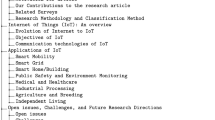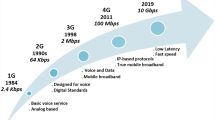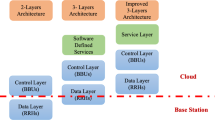Abstract
Power management has increased its significance in mobile communications along with the growing population of mobile users and wireless connectivity. In this paper we propose a smart scheduling algorithm in Android network kernel to increase power efficiency. As periodically-updating applications start sync with a DNS query packet, we defer the packets in order to make these applications synchronize from smaller time difference to finally simultaneously. To implement the idea, we design the algorithm for two or more applications in this paper. This algorithm is composed of several mechanisms: approaching, aligning, and maintaining. By experiments we show the practicability and the comparison between the energy saving ratios in different scenarios.














Similar content being viewed by others
References
Carroll, A., & Heiser, G. (2010). An analysis of power consumption in a smartphone. In Proceedings of the 2010 USENIX conference on USENIX annual technical conference.
Balasubramanian, N., Balasubramanian, A., & Venkataramani, A. (2009). Energy consumption in mobile phones: A measurement study and implications for network applications. In Proceedings of the 9th ACM SIGCOMM conference on Internet measurement conference.
Huang, J., Xu, Q., Tiwana, B., Mao, Z. M., Zhang, M., & Bahl, P. (2010). Anatomizing application performance differences on smartphones. In Proceedings of the 8th international conference on mobile systems, applications and services.
Agarwal, Y., Chandra, R., Wolman, A., Bahl, P., Chin, K., & Gupta, R. (2007). Wireless wakeups revisited: Energy management for VoIP over Wi-Fi smartphones. In Proceedings of the 5th international conference on mobile systems, applications and services.
Pering, T., Agarwal, Y., Gupta, R., & Want, R. (2006). CoolSpots: Reducing the power consumption of wireless mobile devices with multiple radio interfaces. In Proceedings of the 4th international conference on mobile systems, applications and services.
Shih, E., Bahl, P., & Sinclair, M. J. (2002). Wake on wireless: An event driven energy saving strategy for battery operated devices. In Proceedings of the 8th annual international conference on mobile computing and networking.
Rhl, C., Woesner, H., & Wolisz, A. (2002). A short look on power saving mechanisms in the wireless LAN standard IEEE 802.11. In Advances in wireless communications (pp. 219–226). Springer US.
Gobriel, S., Maciocco, C., & Tai, T.-Y. C. (2010). Long Idle: Making idle networks quiet for platform energy-efficiency. In 2010 fifth international conference on systems and networks communications (ICSNC).
Hoque, M. A., Siekkinen, M., & Nurminen, J. K. (2011). On the energy efficiency of proxy-based traffic shaping for mobile audio streaming. In 2011 IEEE consumer communications and networking conference (CCNC).
Ravi, N., Scott, J., Han, L., & Iftode, L. (2008). Context-aware battery management for mobile phones. In Sixth annual IEEE international conference on pervasive computing and communications, 2008, PerCom 2008.
Manweiler, J., & Choudhury, R. R. (2011). Avoiding the rush hours: WiFi energy management via traffic isolation. In Proceedings of the 9th international conference on mobile systems, applications, and services.
Acknowledgments
This work was supported by HTC. This work was also supported by Ministry of Education and National Taiwan University under Grants AE00-00-04, and AE00-00. This work was also supported by National Science Council, National Taiwan University and Intel Corporation under GrantsNSC 100-2911-I-002-001, and 101R7501.
Author information
Authors and Affiliations
Corresponding author
Rights and permissions
About this article
Cite this article
Hsieh, CH., Chao, SL., Chen, YY. et al. Smartphone Traffic Engineering for Energy Efficient Communications: Design and Experimental Evaluation. Wireless Pers Commun 74, 1179–1196 (2014). https://doi.org/10.1007/s11277-013-1571-4
Published:
Issue Date:
DOI: https://doi.org/10.1007/s11277-013-1571-4




